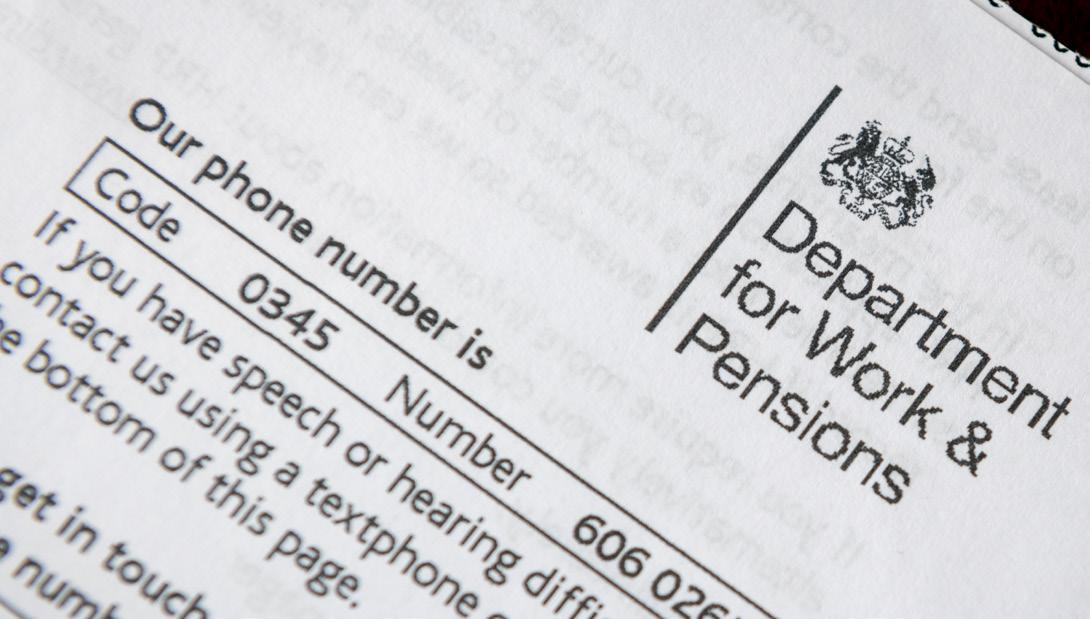
3 minute read
What can I do if I’m forced to wait for the state pension?
Our expert looks at the various proposals from the Government and what might happen when
I’ve just turned 60 and was expecting to receive my state pension at age 67. I’m now worried that the Government is going to change the timetable and leave me high and dry. Is there anything I can do?
Colin
Tom Selby, AJ Bell Head of Retirement Policy, says:

While there are stories about the Government potentially accelerating a planned increase in the state pension age to 68, nothing has been formally announced. Secondly, based on previous statements it is unlikely any change in the timetable would impact your state pension age.
The current UK state pension age is 66. Those who build up an entitlement to the full flat-rate state pension receive £185.15 per week, or just shy of £10,000 a year. Because this new system was only introduced in 2016 and your entitlement is based on several factors including your National Insurance record, it is possible you will receive more or less than this amount.
Plans set out by previous Governments mean the state pension age will increase to 67 between 2026 and 2028, and it is expected to then rise again to 68 between 2044 and 2046. During those two-year transition periods, some people would have a state pension age between 66 and 67, and 67 and 68.
A review of the state pension age is ongoing and there are rumours the proposed increase to age 68 could be brought forward to the 2030s.
While this would likely impact millions of people’s retirement plans, the Government has previously said any shift in the state pension age timetable would give people at least a decade of notice. As you are within seven years of your state pension age, you should not be affected –although it’s worth keeping track just in case that position changes.
The impact of an accelerated state pension age increase to 68 would depend on the timing of that rise.
If the increase to 68 is brought forward by seven years to 2037-39 – a proposal previously set out by the Government in 2017 – this could mean:
• Anyone born on or before 5 April 1970 would have a state pension age of 67;
• Anyone born from 6 April 1970 – 5 April 1971 would have a state pension age between 67 and 68;
• Anyone born from 6 April 1971 onwards would have a state pension age of 68.
If the increase to 68 is brought forward to 2035-37, this could mean:
• Anyone born on or before 5 April 1968 would have a state pension age of 67;

• Anyone born from 6 April 1968 to 5 April 1969 would have a state pension age between 67 and 68;
• Anyone born from 6 April 1969 onwards would have a state pension age of 68.
If the Government goes for the nuclear option and the increase to 68 is brought forward to 2033-35, this could mean:
• Anyone born on or before 5 April 1966 would have a state pension age of 67;
• Anyone born from 6 April 1966 to 5 April 1967 would have a state pension age between 67 and 68;
• Anyone born from 6 April 1967 onwards would have a state pension age of 68;
But it’s important to note none of this is set in stone yet. Once the Government sets out detailed plans, we’ll make sure you know exactly what will happen and how you might be affected.
DO YOU HAVE A QUESTION ON RETIREMENT ISSUES?
Send an email to asktom@sharesmagazine.co.uk with the words ‘Retirement question’ in the subject line. We’ll do our best to respond in a future edition of Shares.
Please note, we only provide information and we do not provide financial advice. If you’re unsure please consult a suitably qualified financial adviser. We cannot comment on individual investment portfolios.
Capital gains tax is about to become a big headache for many more investors. Under current rules, individuals have a relatively generous £12,300 of investment gains which they can realise each tax year without being subject to tax.

However, the Chancellor has announced that from April 2023, this allowance will fall to £6,000, and then from April 2024, it will be cut to just £3,000 a year. Any gains above these levels are taxable at 10% or 20% for basic and higher rate taxpayers respectively, with an additional 8% tax on residential property sales.
This is going to cause problems for investors on two counts. First, they now face a higher tax bill when selling investments. Second, more investors are going to find themselves caught up in capital gains tax calculations, which can be beastly to say the least.
HOW CAN I REDUCE OR AVOID CAPITAL GAINS TAX?
There are a range of options open to investors who wish to mitigate the capital gains tax they are going to pay on their investments.
The most obvious is to make appropriate use of pension and ISA allowances, as gains made within these shelters are free from capital gains










